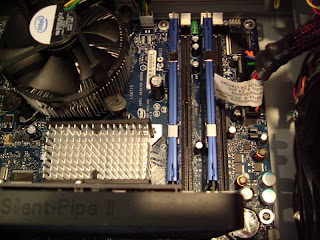Better than Microsoft's Windows Calendar.
Here are my specifications for a good calendar system:
- A nice application window with several views, including day, week, and month;
- Compatible with on-line calendars such as Google Calendar;
- But it must continue to work when there is no internet connection;
- Calendars sharable within my own network;
- Reliable pop-up reminders of calendar events; and
- The same application should work on all of the computers on my network.
After I discovered
Windows Calendar on my new Vista 64-bit machine, I set it up with several different calendars, moving all of that information off of an older machine which I then shut down. It sort of worked, and I found it useful, but with these issues:
- It only worked on my Vista machine, not on XP machines, so I couldn't use it to maintain a central calendar accessible from all machines.
- It was unreliable, in two different ways:
- Reminders did not work unless Windows Calendar was running, regardless of the setting of the option called "Reminders should show when Windows Calendar is not running."
- Windows Calendar didn't always start when Windows started. That meant that I couldn't depend on reminders, period, because I can't depend on myself to notice whether it's running every time the computer restarts.
- Setting an appointment (event) for later in the current day was quite awkward: As soon as I clicked on New Appointment, I would get an immediate "reminder" because the default time for the reminder was prior to the current time. The reminder had to be dismissed before any other information could be entered into the new appointment. Yuck - don't they ever try their own software?
- After a new event was set up, there was no way to know whether it had been published. No final "save" command or "appointment saved" acknowledgment.
- HELP on Vista Calendar is worthless. Clicking on Help gives one page of instructions for doing those things that are patently obvious anyway. There is no overview, no explanation of the difference between an "appointment" and a "task," no instructions for keeping the calendars in a folder of MY choice (one that will be backed up frequently).
Windows Calendar isn't a bad application, but it isn't good either. It's Microsoft.
A quick Google search produced
Mozilla Sunbird, an open-source cross-platform multi-language calendar which runs on Linux, Windows, Mac, and a few other systems. It resolves most of the problems mentioned above:

- It works on both Windows Vista and XP;
- It has been quite reliable so far although, as with Windows Calendar, Sunbird must be running for reminders to work;
- It's much easier to set up a new event, especially on the current day;
- There is no question when the new event has been published.
It does NOT have a help file, however, except an on-line help which works with Mozilla browsers (Firefox) but not with Internet Explorer. The people who do Mozilla must really hate IE! Maybe I'll install Firefox and take a look at that help file someday. And who knows, maybe I'll like Firefox.
Getting Started with Sunbird:
Here is the web page for
downloading Mozilla Sunbird. Installation on Windows was uneventful on my systems.
Sunbird supports two kinds of calendar files: (1) Its own internal data base, not accessible from other computers; and (2) iCalendar (.ics) files, a standardized format in which each file is a separate calendar, accessible from other computers if located in a shared folder. Sunbird will create the first kind of calendars, but it will not conveniently create the second kind, unless I've missed something.
I have a main computer (the one I built) and a laptop, and others in my family also have computers, so I needed sharable iCalendar files. Here is how I created all of my calendar files:
- Some of my calendars already existed in Windows Calendar, so I simply "published" those to .ics files in the folder of my choice.
- For the rest, I created an empty file with the extension .ics in a folder of my choice as follows:
- Right-clicked in that chosen folder, clicked New, then Text Document.
- Renamed that file "calendarname.ics," where "calendarname" is the name I wished to give that particular calendar. When Windows asked if I really wanted to change the name extension, I answered Yes.
- In Sunbird, I clicked File, then Open Calendar File, then
- Navigated to the file I created, clicked on it, and clicked Open.
- That calendar then appeared in my calendar list, so I added events, and also edited the calendar's properties.
- I actually deleted the default calendar called "Home" because there was no need for it.
Why would anyone want more than one calendar?
Because (1) It may be convenient to organize calendars by topic or activity, e.g. one for taking medicine (daily reminders), a different one for business appointments, and yet another for repeating things that don't change, like birthdays; (2) With several calendars all displayed at once the calendar window may get quite busy, so it may be helpful to be able to temporarily suppress the information from one or more calendars to better view the other calendars; and (3) Some of the calendars that show in my window may belong to someone else, from another computer on the network or from the internet, such as a calendar of US holidays.
Examples of calendars that appear on my Sunbird window:
- Medicine reminders;
- Business and other appointments - anything that may come up;
- Repeating events such as birthdays, backup reminders, tax payments; and
- US Holidays.
To make Sunbird ALWAYS start up minimized at bootup on XP and Vista:
Windows XP: 
- Put a shortcut to Sunbird on the desktop so that it will be handy. If there is not a shortcut there already, click the Start button, then go to Programs, then Mozilla Sunbird, RIGHT-click Mozilla Sunbird, drag it to the desktop, and click "copy here."
- In Windows Explorer, navigate to c:\Documents and Settings, then User (whichever user wants startup at boot), then Start Menu, then Programs, then Startup.
- Move the Sunbird shortcut from the desktop into Startup.
- Right-click the Mozilla Sunbird shortcut, click Properties.
- Change "Run:" from "Normal Window" to "Minimized." Click Apply. Click OK.
Windows Vista: 
- Put a shortcut to Sunbird on the desktop so that it will be handy. If there is not a shortcut there already, click the Start button, then go to Programs, then Mozilla Sunbird, RIGHT-click Mozilla Sunbird, drag it to the desktop, and click "copy here."
- In Windows Explorer, navigate to c:\Users, then User (whichever user wants startup at boot), then AppData, then Microsoft, then Windows, then Start Menu, then Programs, then Startup.
- Move the Sunbird shortcut from the desktop into Startup.
- Right-click the Mozilla Sunbird shortcut, click properties.
- Change "Run:" from "Normal Window" to "Minimized." Click Apply. Click OK.
That will do it - anything in that Startup folder will be started at bootup, and you have told Windows to start it minimized. Reboot and try it out.
Remaining Problems:
Help File: Neither Windows Calendar nor Sunbird has a useful help file built in. If you use the Firefox browser, then you may have a help file for Sunbird - I haven't tried it.
With both calendars, reminders will not work if you close the application. If you use reminders, then DO NOT EVER click on the X in the upper right corner of the window. Minimize the window instead. I hope to find a fix for this issue in Sunbird. I'd also like to move it from the main taskbar to the notification area (system tray), though I think this is a bit beyond my expertise at the moment.
Comments are invited.





